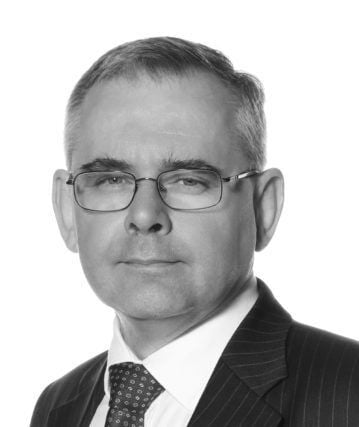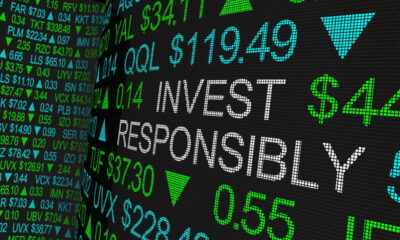

Features
A Q&A with Simon Howard, Chief Executive of UKSIF
Readers of Blue & Green Tomorrow (BGT) will, we hope, have been looking at the animation and tweets coming out of Good Money Week, the annual initiative co-ordinated by UKSIF to promote the idea that “you can make money and make a difference”. UKSIF is the UK Sustainable Investment and Finance Association, a group of some 230 financial service firms with an interest in sustainability. The UKSIF team has been busy on GMW but Simon Howard found some time to answer six questions for us:
What has been the most interesting development in sustainable investment in 2016?
There is a great deal to consider – it has been a good year! I have written before for BGT on the excellent developments in fiduciary duty that we have seen from the Pensions Regulator (TPR), but I will flag it once more: TPR has told trustees of defined contribution pension funds that they SHOULD consider all material financial factors. To any sensible person this must have the effect of putting climate change on the agenda of everyone involved in providing pensions for others – whether that is in Defined Benefit (DB) or Defined Contribution (DC) form or in the context of giving advice.
Looking forward it means that a range of other factors such as the impact on the corporate reputation of aggressive corporate tax behaviour and the threat of anti-microbial resistance should begin to be discussed too. In fact I think TPR’s statements mean responsible investment will become the standard approach.
Beyond that I continue to note the monthly retail sales statistics from the Investment Association. They have a category called “ethical”. In terms of funds currently outstanding ethical accounts for about 1%, but the sales month-by-month in the past year or so have consistently been more than 3%. This is a really interesting gain in market share. Some UKSIF members have suggested it is sales in DC pension schemes showing up.
Also interesting have been some of the comments from the new Prime Minister. Her suggestion that employees and consumers be represented on company boards, and that annual pay votes be binding go further than many commentators were expecting. It all suggests that corporate responsibility may shoot up the political agenda.
Mrs May has also set up the Inclusive Economy Unit (IEU) under Rob Wilson MP. The mission of the IEU, enthusiastically espoused by Mr Wilson when he spoke at Good Money Talks on 24th October, is to encourage better use of private investment and support markets that deliver social impact as well as financial returns, to improve delivery of public services to increase social impact while bringing value for money in the commissioning of public services, and to encourage responsible business, from social enterprise startups to companies that aim at “profit with purpose”. If we start seeing developments in the social/impact space it will be extremely exciting.
And the most frustrating development?
I’m an idealist and like things to be simple. It’s extremely frustrating that the logical conclusions of COP21 and all the other work being done on responsible and sustainable investing are not being taken up more rapidly. There are successes and there is movement but it is too slow.
What is the biggest theme for sustainable investment in 2017?
UKSIF will continue to work on the fiduciary duty area. We want to translate the “should consider” guidance from TPR into more areas e.g. DB pensions and contract based DC, so we will be doing a lot of work with regulators. But with a lot of political change underway perhaps it’s fair to say that the big issue of 2017 may not yet have been identified. It’s possible for instance that the UK may see significant fiscal stimulus with a green tinge to it as part of the Brexit-economic mitigation plan. UKSIF is suggesting that!
Do you think we have reached, or are approaching, the tipping point in the take up of sustainable investment?
I don’t know about a tipping point but it certainly feels different to me. In the institutional space people know that COP21 meant something and so climate change is on the agenda. TPR opinion cited above and the retail sales figures also suggest change is coming. There is a long way to go and a recession or market collapse won’t help but I think things are going our way.
What impact do you think Brexit will have on sustainable investment?
I think sustainable investment is relatively Brexitimmune. At the bluntest level CO2 priced in sterling or euros is still CO2. But I don’t think a UK government could seriously retreat from existing EU-inspired regulation and if we get a Democrat president in the USA I don’t think the global drive will ebb. As I said above we may even see a fiscal package with a greenish tinge, certainly that is what we will be pushing for. People more expert than me tell me that the UK is already ahead of the EU in certain areas of climate regulation and I don’t expect that to change. Famous last words. I am worried about fracking, especially if it is proposed as anything other than a bridge technology, but I suspect the protests we will see as fracking comes in will tend to drive “our” issues up the political agenda and not down. Certainly Mrs May’s comments on corporate governance do not suggest she is an opponent of change and responsible attitudes. I may be wrong. I hope not. We should remember that the government has a very small majoritythey can’t be too radical in any area without a referendum behind them.
If you could make one change to benefit sustainable investment, what would it be?
That’s a very wide question isn’t it? I’m from a fund management background and so my answer will be pretty prosaic- no doubt your other contributors have the really big picture answer. At one level proper pricing of externalities would be a game changer. Combine that with more transparency throughout the financial services value chain and we may get somewhere quite fast. The practical answer for 2017 is as abovemore fiduciary duty in regulation.
Company Profile
The UK Sustainable Investment and Finance Association (UKSIF) is the membership association for sustainable and responsible financial services. We promote responsible investment and other forms of finance that support sustainable economic development, enhance quality of life and safeguard the environment. We also seek to ensure that individual and institutional investors can reflect their values in their investments.
This article was first published in our latest Guide to Sustainable Investment






























